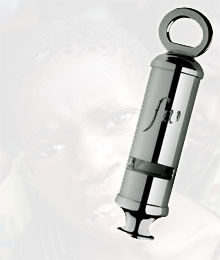Falling Whistles: Democratic Republic of Congo Exposed
November 30, 2010 by Madeline Stephenson
Filed under Special Features
 Rich orange flames dance across a striking African savannah in the continent’s heart. Serge Kaptegaine is trapped inside a burning house. The doors are locked, windows bolted shut. The only thing he’s certain of is that there is no escape. His fate lies miles away in the hands of the Western world, but no one can hear his cries. He clings to his only hope that someone, somewhere, is calling 911. “This is a small picture or idea that I can give you about the war,” says Kaptegaine of his psychological experience in the resource-rich, conflict-ravished Democratic Republic of Congo. “When I’m talking about fire, I’m talking about realities where you are tortured. I am talking about realities where for days you don’t even think about war, you don’t think about food. The only thing on your mind is ‘how am I going to be tomorrow or the next five minutes?’” Murder, rape and young children being used as human shields are ongoing impunities of a crisis that’s been deemed Africa’s World War.
Rich orange flames dance across a striking African savannah in the continent’s heart. Serge Kaptegaine is trapped inside a burning house. The doors are locked, windows bolted shut. The only thing he’s certain of is that there is no escape. His fate lies miles away in the hands of the Western world, but no one can hear his cries. He clings to his only hope that someone, somewhere, is calling 911. “This is a small picture or idea that I can give you about the war,” says Kaptegaine of his psychological experience in the resource-rich, conflict-ravished Democratic Republic of Congo. “When I’m talking about fire, I’m talking about realities where you are tortured. I am talking about realities where for days you don’t even think about war, you don’t think about food. The only thing on your mind is ‘how am I going to be tomorrow or the next five minutes?’” Murder, rape and young children being used as human shields are ongoing impunities of a crisis that’s been deemed Africa’s World War.
Sean Carasso has made it his life purpose to broadcast this message. The 28-year-old’s mission began when he impulsively decided to leave the comfortable confines of California’s coastline in 2007 to explore a new milieu. At the time, he was unaware that his travels to Africa would inevitably impact his life in haunting and compelling ways. Carasso’s journey brought him to DR Congo where he found a military camp that was beating former child soldiers. “Those boys told us that the kids that were too small to carry a gun were being sent to the front lines armed only with a whistle. They were sent out as human shields. The idea is that they would go out and blow the whistle at night to scare away the enemy and in failing that, they were supposed to receive the bullets with their bodies,” says Carasso, who successfully exposed the issue to United Nations. The encampment was later shut down and the boys were released.
Feeling helpless and traumatized upon returning to California, Carasso was unable to conceptualize the idea of other young kids suffering such horror. He immediately wrote a blog called “Falling Whistles.”
Unable to attend social events without screaming about the atrocities he witnessed, Carasso’s friend bought him a vintage whistle that he found online. “He put it around my neck and he said no matter where you go, keep those boys alive in your heart.” Instantly, everywhere Carasso went, people would ask about his necklace and profound conversations began permeating Western sound waves. With empty pockets, Carasso and some friends crafted a plan to sell whistles to raise funds for war-affected children in Congolese communities and demand accountability from government officials.
Three years later during a campaign stop in Toronto, the gunmetal whistle wrapped around Carasso’s neck suddenly holds significant meaning. “We’re building a dynamic coalition across the world of young people who won’t quit until they see the end of this war,” says Carasso, who’s Falling Whistles campaign team has met with members of the White House and is currently working to rehabilitate 267 kids in DR Congo.
“I just want to thank them for what they did; I just want to thank them. I don’t have the words to say,” says Kaptegaine of the work Carasso has done with his Falling Whistles campaign. When he arrived in Winnipeg as an Eastern Congolese refugee in 2005, his emotional baggage far exceeded any human’s comprehendible capacity. Along with his suitcase, the soft-spoken father of two carried nothing other than the mementos of a five-year war that stained his passport with bloodshed and left a humanitarian plight of catastrophic proportions. “I wish that I could have come to Canada as a tourist and not as a refugee because before becoming that refugee, there is a hell that you go through,” says Kaptegaine, 34. For him, that hell was a mineral-fuelled war that sent him to jail for trying to help mothers prevent their children from being used as pawns in unthinkable war crimes and separated him from his daughters. Despite his immense contentment with Canada, memories of Kaptegaine’s past painfully linger. “Why should I go through it, why? I’m a human being, I have blood in my skin, I have a head that thinks,” his voice cracks as tears take over.
Though the war that broke out in 1998 officially ended in 2003, its aftermath catapulted the country down a dark hole of destruction and atrocity, with rape and murder occurring at exponential rates. As of 2007, the UN pegged DR Congo’s death toll at 5.4 million since the start of the war, which is the highest figure since World War II. More recently, Nicholas Kristof, a columnist for The New York Times and multiple Pulitzer Prize winner who’s kept an investigative gaze on the conflict for years, estimates that the total is now likely closer to 6.9 million, with approximately 1,500 people dying every day from conflict-related causes such as violence, malnutrition and disease.
James Stewart, a law professor at The University of British Columbia, recently presented a report at a conference in The Hague, Netherlands, titled Corporate War Crimes: Prosecuting the Pillage of Natural Resources. “The best way that I can describe [the conflict] is as a vicious triangle with outrageous violations of human rights. You have illicit arms transfers on one periphery and then illegal exportation of natural resources on the other,” says Stewart, a former war crimes prosecutor. It becomes a brutal cycle where imported guns are sold to villagers as a form of false security in exchange for valuable exports that are illegally exploited. DR Congo’s “natural resource curse” means that its abundance in valuable exports like diamonds, gold, cobalt, copper, crude oil and coffee make it a hot spot for many North American companies that capitalize on minerals to make high-tech devices like cellphones and computers. One of the questions asked at the conference was how much cellphone costs will rise if people start insisting on legal trade. “I think it’s a good question, but it’s not an ethically difficult question. The question is: How much does your cellphone cost now, not just to you, but to people who pay for it in blood?” asks Stewart. With a long-standing history of violence and the highest mortality rate in the continent, it’s incontestable that something significant needs to take place in order for change to transpire. “I think what we really need is a clear message from the public to our government that we will not tolerate our companies pillaging natural resources. We as a community, we’re not interested in participating in atrocity,” says Stewart.
Despite each of their distinct experiences, the commonality between Kaptegaine, Carasso and Stewart is the shared conviction that peace is not only within reach, but in the palms of our own hands. “I think that in the end, as consumers, we’re in charge of what our corporations do, and as citizens, we’re in charge of what our governments do. If enough of us want it, we’re going to get it,” says Carasso. Stewart’s passion is similarly staunch. His will to inform the public about corporate war crimes and provide a practical roadmap for prosecutors of domestic criminal systems is also fuelled by optimism. “I wouldn’t be doing this work if I didn’t see peace there,” says Stewart pragmatically.
For Kaptegaine, Canada provided an escape, but his crusade to see peace in DR Congo continues. It is here that he’s been able to establish Hand in Hand for Peace and a not-for-profit firm called Ref-Nyota that aids in the reintegration process of refugees. “Let’s work and try to find a solution,” says Kaptegaine, who is thrilled to have voted for the first time in his life this October in Winnipeg’s municipal election. “Without more concern for each of us, and challenging organizations or even our government, then nothing will change. But if we can do that, then I continue to believe: change will come. Change will come.”
www.fallingwhistles.com
To watch a full interview with Sean Carasso, log onto www.citylifetv.ca/falling_whistles.html












I have not heard about this movement before. Thank you for posting this. I will check it out.